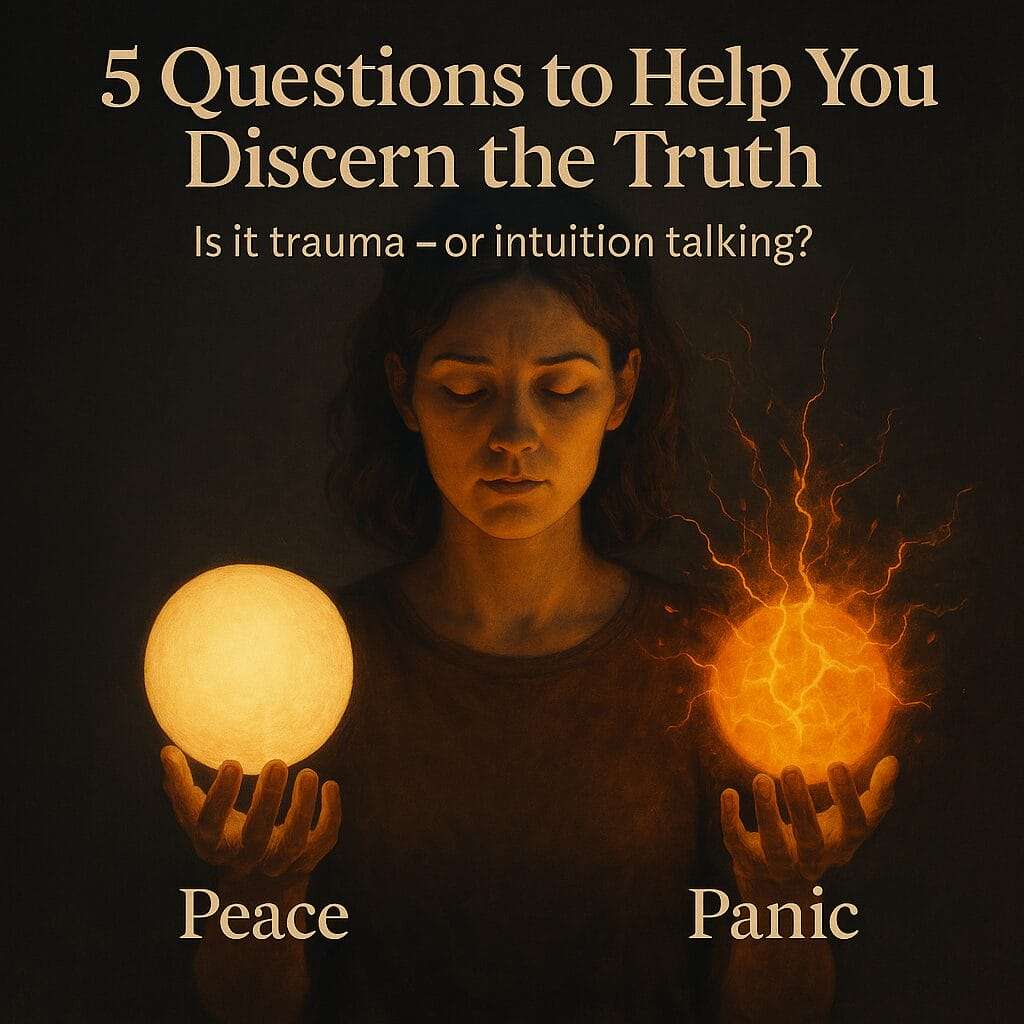“You said yes, but your chest tightened. Was it wisdom—or a wound?” That’s the million-dollar question: was it a trauma response or intuition?
Your body reacted before your brain could weigh in. A tight chest, a sudden urge, a wave of dread—was that inner guidance trying to protect you, or an old wound pulling the strings?
If you’ve lived through trauma and happen to lead a business or team, you already know this isn’t just a personal issue—it’s a leadership one. Split-second decisions shape relationships, deals, and your sense of self. But if you can’t tell the difference between gut instinct and fear in disguise, you’ll keep second-guessing everything—or worse, stay stuck in old patterns.
As a healing and leadership coach, I’ve walked this path with clients who want to grow but feel trapped by invisible forces. This article will help you spot the signs, name what’s happening, and move forward with clarity—not confusion.
Let’s unpack it together.
But first, let’s define intuition and trauma.
What Is Intuition? What Is a Trauma Response?
Before we can tell the difference, we need to define the terms clearly.
Intuition: When Wisdom Whispers
Intuition often shows up as quiet, grounded clarity. It’s that inner knowing that doesn’t scream—but it doesn’t stutter either. You just know. No panic, no drama, just a steady sense that something is right—or wrong.
Psychologist Carl Jung called it “perception via the unconscious,” meaning your brain is picking up on patterns and signals without needing to explain itself first. You’ve lived long enough, seen enough, and felt enough to recognize what’s going on—even if you can’t immediately name it.
Here are some clues that you’re working from intuition:
A feeling of calm or neutrality (not panic or urgency)
A deep alignment with your personal values
A quiet “yes” or “no” that feels settled—not forced

Maybe you’re offered a high-paying contract, but something in your gut says nope—not because you’re scared, but because the energy feels off. Or maybe someone new enters your life and, even without a long backstory, you feel open and safe around them. That’s intuition.
Malcolm Gladwell talks about this in his book Blink—he calls it the “theory of thin slicing.” Basically, it’s the ability to make smart, fast decisions using very little information because your brain already has a lifetime of context stored up.
Said more plainly: you don’t need a full report. You’ve been here before, and your body remembers. And when you’re tuned in, that remembering becomes wisdom.
Now, that doesn’t mean we always get it right. Sometimes what feels like intuition is actually old pain steering the ship. That’s where trauma enters the chat—and we’ll unpack that next.
Trauma Response: When Fear Feels Like Wisdom
A trauma response is fast, emotionally charged, and driven by fear. It’s your nervous system kicking in to protect you—based not on the present moment, but on the past.
Here’s how it usually shows up:
Fight – You get confrontational or lash out
Flight – You avoid, escape, or disappear
Freeze – You shut down, unsure what to do next
Fawn – You people-please, over-accommodate, or lose yourself trying to keep the peace
Let’s say you keep dodging networking events. On the surface, it might feel like intuition—“this just isn’t for me.” But if you look underneath, it might be fear of judgment or past memories of exclusion. That’s not intuition. That’s trauma in disguise.
And the rabbit hole goes deeper.

You might identify as an introvert who “just prefers small and intimate settings.” But what if it’s not introversion at all? What if you’re actually dealing with unhealed social anxiety—the kind that forms after years of being minimized, bullied, or shamed by emotionally stunted people?
In over ten years of doing this work, I’ve rarely met someone whose avoidance, aversion, or over-accommodation wasn’t connected to something deeper.
Trauma leaves a residue. It doesn’t always scream—but it shapes how you show up.
So if you’re reading this and thinking, “Whoa…” — you’re not alone.
It is a lot to take in—especially if you’ve been surrounded by people who’ve made their trauma responses sound like wisdom. People who encouraged you to bail on growth opportunities not because it was right for you, but because it helped them stay emotionally safe.
And yes—both intuition and trauma responses can feel like gut instincts. That’s why they’re so easy to confuse.
That’s exactly what we’re going to unpack next.
Why It’s So Hard to Tell the Difference Between Trauma Response or Intuition
The overlap between intuition and trauma responses starts in the body.
Your subcortical brain—the part that controls instinctive reactions—processes both intuitive insights and trauma-related triggers. That means your “gut feeling” could either be wisdom from lived experience or fear rooted in unresolved pain.
And let’s be honest: they can feel exactly the same in the moment.

Common Confusion Points
Saying Yes Out of Fear: You agree to collaborate on a project, not because it aligns with your goals—but because saying no feels unsafe. You’re afraid of rejection, not excited about the opportunity.
Avoiding Someone Due to Projection: You avoid someone who reminds you of a past hurt. You chalk it up to “bad energy,” but really, it’s unhealed trauma whispering be careful, even when there’s no danger present.
As Dr. Bessel van der Kolk puts it,
“A trauma response is like a smoke alarm going off in your body when there is no fire present.”
That makes discernment hard—but not impossible. With practice, you can tell the difference.
I could give you a dozen stories where I couldn’t tell the difference myself.
I remember saying, “Yes, I’ll marry you,” to my ex-fiancé—not out of love, but because I was more afraid of being alone than facing the truth: we were both emotionally bankrupt.
And then I said no to fully paid graduate programs because I was scared I couldn’t finish. Not because I lacked the intellect, but because I lacked the self-trust.
Maybe you’ve turned things down too—because of a painful past.
Maybe you over-accommodated someone who barely knew you, because being neglected or abandoned taught you to shapeshift fast just to stay “safe.”
No shame. I did that for decades.
But let’s go deeper now.
In the next section, I’ll ask you five key questions to help you discern:
Is it your intuition—or your trauma response—calling the shots?
5 Questions to Help You Discern the Truth
(Is it trauma—or intuition talking?)
This isn’t about overanalyzing every feeling. It’s about learning how to pause, get honest, and trust your body without letting fear hijack the wheel. These five questions can help you get clear when you’re in the thick of it:

1. Am I Feeling Peace or Panic?
Intuition is calm. It doesn’t rush. It doesn’t shout. It whispers, “This way,” even when the choice feels hard.
A trauma response, on the other hand, is chaotic and loud. You might feel panicked, dizzy, foggy, or flooded with urgency.
✨ Check your body. Are your shoulders up by your ears? Is your breath shallow? Is your chest tight or stomach flipping?
Those are signs your nervous system is activated—not your intuition.
2. Is There a Specific Memory Tied to This Feeling?
Sometimes a decision triggers something that has nothing to do with the present and everything to do with your past.
Ask yourself: Does this moment remind me of a time I felt ashamed, rejected, ignored, or unsafe?
If a wave of emotion hits and you find yourself spiraling into old scripts or flashbacks (even subtle ones), that’s likely a trauma echo—not spiritual discernment.
3. Would I Feel Differently After 24 Hours?
Time is a clarifier. Intuition tends to stay steady. It’s not a burst of fear or excitement that fizzles the next morning.
Trauma, however, loves urgency. It says “do something now or else…”
If you’re unsure, wait a day. Take a walk. Journal. Sleep on it. Then ask again: Does this still feel true?
If the answer shifts once the emotional storm passes, you were likely reacting—not discerning.
4. Is This Rooted in Self-Trust or Self-Protection?
This is where it gets tender.
Ask: Am I saying yes (or no) because I believe in myself—or because I don’t want to get hurt again?
Self-trust is about showing up for yourself, even when you’re uncertain. Self-protection, when rooted in unhealed wounds, can feel smart—but often keeps you stuck.
And here’s the trick: Sometimes a trauma response masquerades as empowerment. (“I’m setting a boundary!”)
But if it’s built on fear, not clarity—it’s not a boundary, it’s a bunker.
5. Who Benefits If I Override This Instinct?
This one stings, especially for fawners and former people-pleasers.
Ask: If I override my gut, who gets something from it—and what does it cost me?
If someone else’s comfort, approval, or access comes at the expense of your peace, your truth, or your needs…
You’re not following your intuition. You’re reenacting a pattern.
This is where discernment becomes leadership—because you stop handing the pen to people who were never meant to write your story.
Real-Life Examples: When Trauma Wears the Mask of Intuition
Let’s bring these concepts to life with real scenarios. As you read, try not to slip into pity—either for these folks or for yourself. That’s not the point.
Instead, ask: Have I shown up like this too? Even in small, subtle ways?
This is about awareness, not shame.

🕳 “I Ghosted a Client”
A coach ignored a client’s emails for weeks. The client wasn’t rude—just intense. But their tone reminded her of a hyper-critical boss she once had. Her gut said “back away,” so she did.
But later, she realized it wasn’t her intuition talking—it was her trauma responding. She wasn’t setting a boundary; she was reacting to an old story of being controlled and powerless.
🎭 “I Said Yes When I Meant No”
A business owner agreed to a last-minute collaboration. Her body screamed no, but her mouth said sure!
Why? She didn’t want to disappoint her colleague. She feared being seen as “difficult.”
What she thought was intuition saying “be generous” was actually a fawn response—a survival instinct dressed up as kindness.

💻 “I Deleted the Email Before Opening It”
A creative professional applied to speak at an event. Weeks later, the organizer replied with interest.
But the moment she saw their name pop up, she panicked—deleted the email and convinced herself it “wasn’t the right fit.”
Why? The possibility of visibility triggered old wounds about being publicly criticized.
She told herself it was discernment. In truth, it was self-sabotage hiding as wisdom.
🧍🏽 “I Avoided Her for No ‘Good’ Reason”
A woman in a leadership circle reminded someone of their emotionally distant mother.
They couldn’t name it at first, but every time she spoke, they felt edgy. Not because the woman was toxic—she was just confident.
Still, they dodged conversations, eye contact, opportunities to connect.
That wasn’t intuition. That was projection and avoidance rooted in unresolved maternal pain.
🧳 “I Walked Away Too Fast”
A man left a job offer that was actually aligned with his values—but it came with more responsibility and visibility.
He said his gut told him “this isn’t it.”
In truth, it was—but his fear of failure disguised itself as instinct.
He later admitted, “I didn’t trust that I could rise to the occasion. So I walked away before I could be exposed.”
Each of these examples reveals something crucial:
Your past doesn’t just live in your memories. It lives in your body. And sometimes, it plays dress-up in the name of “intuition.”
That’s why discernment matters.
Coming up next: how to honor your intuition without abandoning yourself—so you can move forward with clarity, courage, and integrity.
How to Rebuild Trust With Yourself
Discernment is like a muscle—it gets stronger the more you use it. You’re not born knowing the difference between trauma and intuition. You learn it through intentional practice and honest reflection. Here are a few tools to help you along the way:

📝 Journaling: Say the Unfiltered Truth
Write down the moments where you felt stuck, conflicted, or torn. Then ask: Was that rooted in fear—or in clarity?
Here’s where it gets tricky. You might want to clean it up, put a bow on it, or make it sound “respectable.” Don’t.
Write the messy version. Even if it makes you, Uncle Jethro, or your clients look bad.
Write what you felt, not what was logical. Write what happened in your body, not what culture says “should have” happened.
The road to inner integrity and deep emotional intelligence begins with telling the whole, ugly truth. Even the parts you were taught to bury.
🧠 Somatic Check-Ins: Listen to Your Body’s Wisdom
Start noticing how your body feels before, during, and after decisions.
Tight chest? Spiked heart rate? That might be fear.
Steady breath? Relaxed shoulders? That’s usually intuition.
Most of us were trained to override our body’s cues. “Sit up straight!” “Smile!” “Be nice!”
So we got good at faking comfort while our bodies screamed underneath.
It’s time to reverse that. Don’t ignore your body—lean into it.
(Nerdy fact you might love: The majority of distress signals aren’t sent from your brain—they’re sent from your gut.)
Your enteric nervous system—also known as the “second brain”—has over 100 million neurons and directly communicates with your body via the vagus nerve. This is why you feel the truth, often before you can think it.
🧍🏽♀️ Seek Support That Doesn’t Just Nod Along
Talk to a trauma-informed coach (like me!) or a trusted therapist who can help you untangle the knots.
Why not just talk to your friends? Because even well-meaning loved ones can’t always hold space for your pain.
They might be too busy managing their own image, comfort, or proximity to your distress. And that’s not shade—it’s just human.
Distance creates perspective. Professional support helps you see the full picture—not just the parts your community is comfortable with.
🧘🏾♂️ Mindfulness Practices: Clear the Noise So You Can Hear the Truth
Meditation, breathwork, or even a quiet walk can help calm your nervous system and reconnect you to your intuition.
Every morning, I start my day with intentional breathwork. Why? Because slow, deep breathing activates your vagus nerve, which regulates your parasympathetic nervous system—the part that helps you stay grounded and calm.
Even five minutes a day makes a difference.
💛 Remember this more than anything else:
Healing isn’t about being perfect.
It’s about building the kind of trust with yourself where you don’t have to second-guess your every move.
And yes, the image below ties it all together—because sometimes, healing isn’t about finding the answer…
It’s about learning how to stay present while you ask better questions.

Final Thoughts
You don’t have to be perfect to be discerning.
Learning to tell the difference between intuition and trauma responses isn’t a one-time epiphany—it’s a practice. A muscle. A sacred kind of remembering.
Every pause, every moment of clarity, every time you choose self-trust over self-protection—you’re building something.
Not just discernment. Integrity. Emotional freedom. Leadership.
So the next time your chest tightens, don’t rush to label it.
Pause.
Ask: Is this wisdom—or a wound?
That question alone can change everything.
Want to go deeper?
🔍 Learn more about how I support clients in their healing and leadership journeys.
🎙️ And listen to my podcast for real talk on growth, trauma recovery, and purpose-driven success.
We’ll keep building clarity, courage, and connection—one decision at a time.



